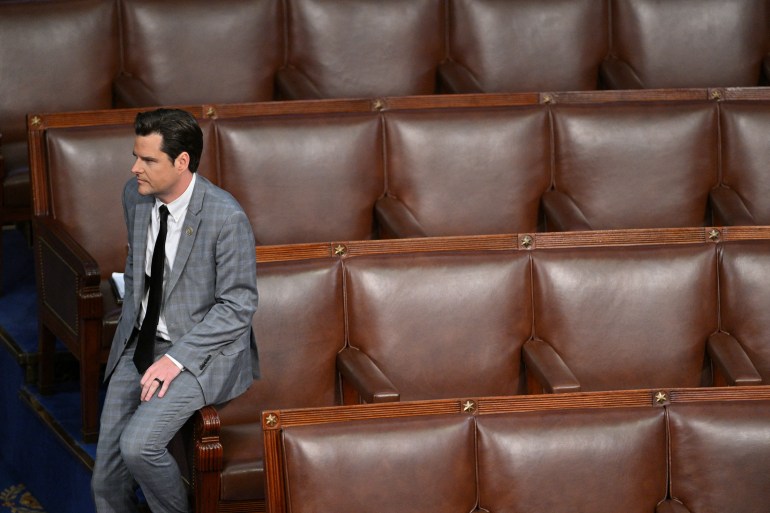Washington, DC – The United States House of Representative has gotten back to work after Republican legislators united to resolve a gruelling deadlock over who would be the next speaker, the chamber’s presiding officer.
But Democrats are warning that a Republican-controlled House with an empowered far-right contingency could spell trouble not only for President Joe Biden’s agenda but also for the basic functions of the US government.
Newly appointed Republican Speaker Kevin McCarthy presided over the chamber on Monday as lawmakers passed a rules package to govern the House for the next two years — guidelines that Democrats argued will make it more difficult to approve vital legislation, including government budget measures.
That rules package included concessions McCarthy had agreed to in order to win the speakership. His candidacy had been blocked 14 times last week by far-right members of his own caucus.
To win the gavel during a historic 15th vote, McCarthy had to give in to certain demands, including lowering the threshold to call for a vote of confidence in the speaker. Now, a single legislator can do it.
Monday’s rules package also contains new regulations that make it more difficult to pass spending bills. Another concession will make it easier for Congress to slash funding for individual federal programmes and agencies.
“What’s clear from all of this is that the Republican Party no longer cares about governing, and this rule package is ‘exhibit number one’,” Democratic Congressman Jim McGovern said on the House floor.
He denounced Republican House leaders who sacrificed their “own dignity” to please the far right.
“The American people sent us here because they want us to put people over politics,” McGovern continued. “Sadly, this rule package puts politics first, empowering the extremists who are only interested in their own power.”
‘We learned how to govern’
But for many Republicans, the deal that emerged from the speaker’s impasse represented a course correction that would put more power in the hands of individual legislators and enable greater debate in the chamber.
“We’re going to have votes on term limits, balanced budgets, enforcement of our immigration laws, & more,” said Florida Congressman Matt Gaetz in a Twitter post celebrating the new rules.
A leading dissenter against McCarthy’s speakership in the initial rounds of voting, Gaetz credited his fellow hold-outs with helping to overhaul the House rules: “NONE of those things would’ve happened if we caved, but with these concessions, the House is in a stronger position.”
Hours before his late-night election as speaker, McCarthy himself suggested that the deadlock would help the Republican caucus resolve its differences in future.
“Because it took this long, now we learned how to govern,” he said.
First bill takes aim at tax agency
The Republican House majority also passed its first bill on Monday — an effort to revoke a boost in spending for the Internal Revenue Service (IRS), the US tax agency.
McCarthy hailed the vote, saying that it was the first order of business because “government should work for you, not against you”.
The bill passed in a 221-to-210 vote along party lines. It would rescind the budget increase of $80bn given to the IRS in last year’s Inflation Reduction Act.
But the Republican-led bill stands no realistic chance of passing in the Democratic-controlled Senate, let alone earning Biden’s approval to be signed into law. The Biden administration has already threatened to veto the measure, calling it a “reckless” effort that would make it easier for large corporations to evade paying taxes.

Congress deeply divide
With Congress divided between a Republican-led House and a Democratic-held Senate, the policy priorities of either party may pass in a single chamber but are unlikely to succeed in both.
Partisan measures, therefore, stand little chance of becoming law, and the current Congress is not expected to pass major legislation that advances the partisan platforms of Republicans or Democrats.
But some analysts have worried that the Republican infighting and Monday’s rules package are a sign of more alarming things to come. They fear that the House may not be able to approve must-pass legislation, including government budgets and bills to raise the debt ceiling.
Congress holds the government’s purse strings: It allocates funds to federal agencies and programmes. Appropriations bills are passed periodically through Congress, but when funds run out, the federal government must either pass a new budget measure or shut down and suspend its functions.
Later this year, Congress needs to approve an increase to the government’s borrowing power, known as the debt ceiling. And Democrats warn that, if the Republican-held House plays politics with the issue, it could lead to disastrous consequences for the US and global economy.
Congressman Ralph Norman, one of the Republicans who initially opposed McCarthy’s bid to lead, said last week that opposing an increase to the debt ceiling is a “non-negotiable item” for right-wing dissenters like him.
Ronald Seyb, political science professor at Skidmore College in Saratoga Springs, New York, said it may be “extraordinarily difficult” to pass spending bills and avoid government shutdowns under the new Congress.
“I don’t recall — at least in my memory — a time where I was more nervous about the possibility that it won’t just be brinkmanship, that it will be over the brink,” he told Al Jazeera.


